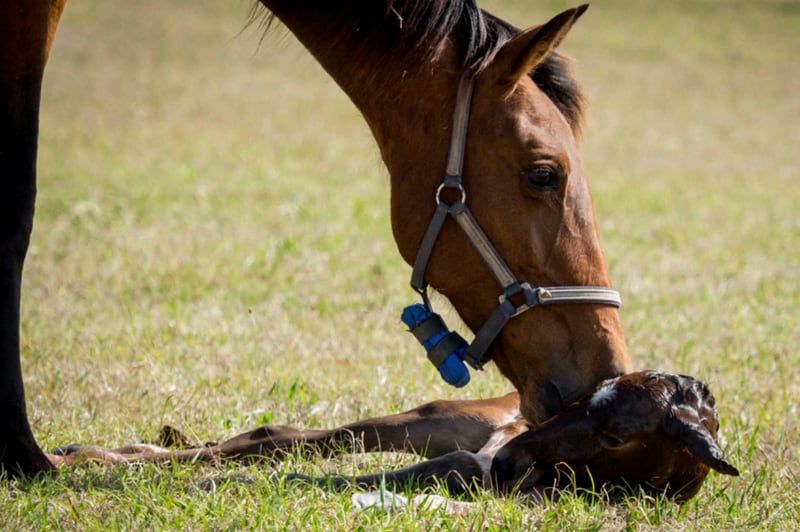Foaling is one of the most exciting, and nerve-wracking, times for any horse owner. Knowing what to expect and when to call your vet can make a big difference in keeping both mare and foal healthy and safe. This guide walks you through the basics of the foaling process, key timelines, and what to watch for before, during, and after birth.
Items in RED indicate when to call a vet immediately
1. The Lead Up
Normal Pregnancy lasts between 320 - 365 days (Average 342), Signs to look for:
- Udder development: 2 - 4 weeks before foaling.
- Waxing of Teats: 1 - 4 days before foaling
- Softening of muscles around the tail head
- Restlessness, sweating and frequent lying down: foaling monitors can be useful to detect this behaviour
The mare should be housed in a clean, warm and protected area at least 2 weeks before foaling to allow time for her to settle. If it is raining or an early foal (colder months) under cover is ideal. Early maturation of the udder, running milk, and poor colostrum production can be signs of Placentitis (under 320 days of Gestation)
2. Labour
Stage 1: Early Labour (30 minutes to 6 hours)
- Signs: Restlessness, tail swishing, pacing, sweating, frequent urination
- What’s happening: The foal is moving into position and the cervix is dilating.
Stage 2: Active Labour (10–20 minutes)
- Water breaks, followed quickly by delivery.
- The foal’s front feet should appear first, followed by the nose (in a diving position).
Call a vet if:
There is no progress in 10 minutes or the foal is not born in 20 minutes
The legs are crossed, upside down or there is only one leg
Stage 3: Expelling the Placenta (up to 3 hours)
- The placenta will be expelled from the uterus/vulva onto the ground
Call a vet if:
The placenta is not complete / torn, or not expelled within 3 hours
3. After the Foal is Born
The 1 2 3 Rule
-
- Foal Stands within 1 hour
- Foal Nurses within 2 hours
- Placenta passes within 3 hours
Foals should pass meconium (the first poo which is form and yellow) within 3 - 4 hours of birth.
If any of these do not happen on time, call your vet
Routine Foal Check
We recommend getting every foal checked by a vet within 12 hours of birth. This allows us to check for:
- Appropriate conformation
- Do a thorough physical exam and assess maturity, risk of sepsis and any congenital abnormalities (wry nose, cleft palate, heart murmurs etc.)
- Check the placenta and the health of the mare + flush her uterus if needed. Assess for any internal or external tears.
- Check the foal’s IgG (appropriate ingestion of colostrum and antibodies
- Administer intervention as needed (enemas, plasma, mare flushes, foal treatment)
4. Emergency Checklist
Make sure you have ready in case of Emergency:
- Your vet’s number handy (07 4982 2552)
- Flash Light / headlamp
- Clean Towels
- Gloves
- Lubricant
- Ropes
- Clean Water
If you have any questions about your mare and her foal or need to book in your new foals first check up call our helpful team on 07 49872 2552.




